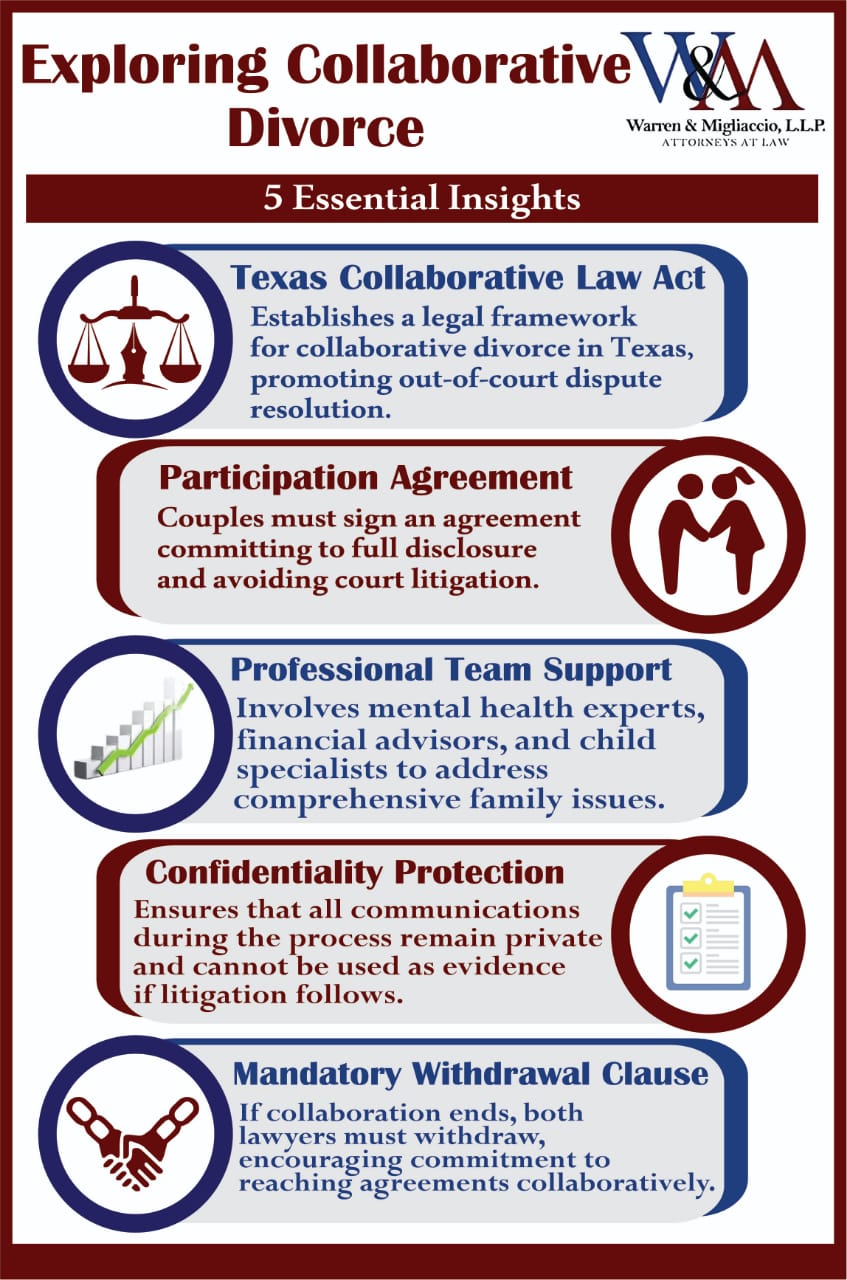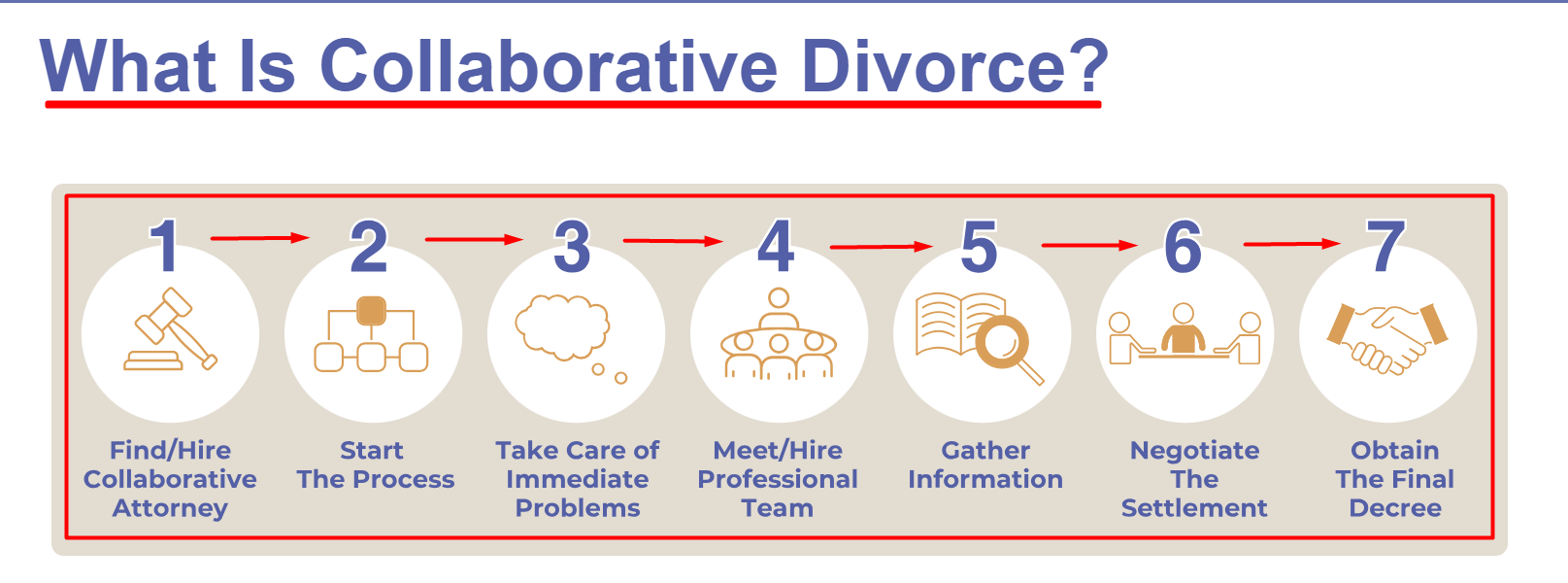Collaborative divorce in Texas is a method of dissolving a marriage where both parties and their attorneys commit to resolving all issues without going to court. Collaborative divorce is governed by the Texas Collaborative Law Act.
What Is the Texas Collaborative Act
The Texas Collaborative Law Act provides a legal framework for this type of divorce proceedings in the state. It was enacted to promote collaborative law as an alternative dispute-resolution method for divorcing couples.

Here are some key points about the Texas Collaborative Law Act:
- Enactment: The Texas Collaborative Law Act was enacted by the Texas Legislature and is codified in the Texas Family Code.
- Purpose: The primary purpose of the Act is to encourage divorcing couples to resolve their disputes in a cooperative and non-adversarial manner through the collaborative process.
- Participation Agreement: The Act requires divorcing spouses who wish to pursue collaborative divorce to sign a participation agreement. This agreement outlines the terms and conditions of the collaborative process, including the commitment to full and honest disclosure of information and the agreement to resolve disputes without going to court.
- Withdrawal Requirement: Under the Act, if either spouse decides to terminate the collaborative process and proceed to court litigation, both collaborative divorce attorneys must withdraw from representing the spouses. This provision encourages both parties and their attorneys to fully engage in the collaborative case and work toward reaching a mutually acceptable agreement.
- Confidentiality: The Act protects the confidentiality of communications made during the collaborative process. This means that discussions, negotiations, and documents exchanged during collaborative meetings cannot be used as evidence in court proceedings if the collaborative process fails and the case goes to litigation.
- Professional Requirements: The Act allows various professionals to participate in the collaborative process, including attorneys, mental health professionals, financial experts, and child specialists. These professionals help divorcing spouses reach agreements on issues such as spouse and child support and property division.
What Is Collaborative Law
Collaborative law is a method of dispute resolution, particularly in family law cases such as divorce, where both parties and their attorneys commit to resolving conflicts through cooperative negotiation rather than adversarial litigation. Here’s how it generally works:

- Voluntary Participation: Collaborative law requires both parties to voluntarily agree to participate in the process. It’s based on the principle that divorcing couples are better served by working together to find solutions that meet both of their needs, rather than relying on a judge to make decisions for them.
- Commitment to Collaboration: Both parties and their attorneys sign a participation agreement, committing to resolving all issues through the collaborative process. This agreement typically includes provisions requiring full disclosure of information, respectful communication, and a commitment to finding mutually acceptable solutions.
- Team Approach: In addition to the parties and their attorneys, collaborative law often involves a team of professionals, such as mental health professionals, financial experts, and child specialists. These professionals provide support and guidance throughout the process, helping the parties address emotional, financial, and parenting-related issues.
- Meetings and Negotiation: The parties and their attorneys attend meetings together to discuss and negotiate the terms of the divorce or other family law matters. These meetings are structured to promote open communication, brainstorming, and problem-solving. The goal is to reach agreements that are fair and acceptable to both parties.
- Out-of-Court Resolution: One key aspect of collaborative law is the commitment to resolving disputes without going to court. If either party decides to terminate the collaborative process and pursue litigation, both attorneys must withdraw from the case, and the parties will need to hire new representation.
- Finalizing Agreements: Once the parties have reached agreements on all issues, their attorneys help draft the necessary legal documents to formalize the agreements. These documents are then submitted to the court for approval, finalizing the divorce or other legal matters.
Advantages of Collaborative Law
Collaborative law offers several advantages compared to traditional litigation, particularly in family law cases such as divorce. Here are some key benefits:

- Control: Collaborative law allows parties to have more control over the outcome of their case. Instead of leaving decisions to a judge, the parties work together to reach agreements that meet their unique needs and priorities. This can lead to more customized and satisfactory resolutions for both parties.
- Privacy: Collaborative law proceedings are private and confidential. Unlike court hearings, which are a matter of public record, collaborative meetings and negotiations take place in a confidential setting. This can help protect sensitive information and maintain the parties’ privacy.
- Reduced Conflict: Collaborative law promotes cooperation and communication between the parties. By focusing on constructive problem-solving rather than adversarial litigation, collaborative law can help reduce conflict and tension between the parties, which is particularly important in family law cases where ongoing relationships, such as co-parenting, may be necessary.
- Cost-Effectiveness: Collaborative law can be more cost-effective than traditional litigation. Because it typically involves fewer court appearances and less time spent on legal proceedings, the overall cost of collaborative divorce or other family law matters may be lower. Additionally, the parties may save on expenses related to discovery, expert witnesses, and other litigation-related costs.
- Faster Resolution: Collaborative law often leads to faster resolution of disputes compared to litigation. Because the parties actively engage in the negotiation process and commit to reaching agreements, they resolve collaborative cases more efficiently, avoiding delays associated with court proceedings.
- Customized Solutions: Collaborative law allows parties to explore creative and flexible solutions that may not be available through litigation. By working together with the assistance of collaborative professionals, parties can develop solutions tailored to their specific circumstances and priorities.
- Preservation of Relationships: Collaborative law can help preserve relationships, particularly in ongoing co-parenting or other family relationships. By promoting respectful communication and cooperation, collaborative law helps parties maintain a more amicable relationship. This benefits children and other family members.
Key Differences Between Collaborative and Traditional Divorce Proceedings
Collaborative and traditional divorce (litigation) differ in several key aspects:
Approach to Conflict Resolution
- Collaborative Divorce: In collaborative divorce, both parties commit to resolving their disputes through cooperation and negotiation outside of court. The emphasis is on finding mutually acceptable solutions with the assistance of collaborative professionals.
- Traditional Divorce Litigation: Conventionally, the parties may rely on the court to resolve their disputes. Litigation involves a more adversarial process, where each party presents their case to a judge, who ultimately makes decisions on issues such as property division, child custody, and support.

Control over the Process
- Collaborative Divorce: In collaborative divorce, parties have more control over the process and the outcome. They actively participate in negotiations and decision-making rather than leaving decisions to a judge.
- Traditional Divorce: In a conventional divorce, a judge makes the decisions. Parties have less control over the process and may feel that the outcome is imposed upon them by the court.
Confidentiality
- Collaborative Divorce: Collaborative divorce proceedings are confidential. Discussions, negotiations, and documents exchanged during the collaborative process are not disclosed in court if the process fails.
- Traditional Divorce: Court hearings and documents filed in court are part of the public record.
- Collaborative Divorce: In many cases, collaborative divorce can be more cost-effective than traditional divorce. The overall cost may be lower since it often involves fewer court appearances and less time spent on legal proceedings.
- Traditional Divorce: Litigation can be expensive due to attorney fees, court costs, and other expenses associated with court proceedings. Costs can escalate further if the divorce is highly contested and requires extensive litigation.
Timeline
- Collaborative Divorce: This form of divorce often leads to faster resolutions than traditional divorce. The process can be more efficient since the parties are committed to reaching agreements and avoiding court battles.
- Traditional Divorce: Litigation can be lengthy, especially if the court docket is crowded or disputes require multiple hearings and motions.
Preservation of Relationships
- Collaborative Divorce: Collaborative divorce can help preserve relationships, particularly in ongoing co-parenting or other family relationships. By promoting respectful communication and cooperation, collaborative divorce may lead to a more amicable post-divorce relationship.
- Traditional Divorce: Litigation, due to its adversarial nature, can strain relationships further. Hostility and conflict in court proceedings may make it more challenging for parties to maintain a positive relationship after the divorce.
How Does Collaborative Divorce Work – Step-by-Step
Here’s how the collaborative divorce process typically works:
- Initial Consultation: Both spouses meet separately with their attorneys to discuss the collaborative divorce process and determine the right option. During this consultation, the attorneys explain the collaborative process, discuss the parties’ goals and concerns, and answer any questions they may have.
- Participation Agreement: If both spouses decide to pursue a collaborative divorce, they sign a participation agreement. This agreement outlines the terms and conditions of the collaborative process, including the commitment to full and honest disclosure of information, respectful communication, and the agreement to resolve disputes outside of court.
- Team Building: Depending on the specific needs of the case, the parties may assemble a collaborative team, which can include attorneys, mental health professionals, financial experts, and child specialists. These professionals provide support and guidance throughout the process, helping the parties address emotional, economic, and parenting-related issues.

- Meetings and Negotiation: The parties, their attorneys, and collaborative professionals attend meetings to discuss and negotiate the terms of the divorce. These meetings are structured to promote open communication, brainstorming, and problem-solving. The parties work together to identify their interests and concerns, explore options for resolution, and reach agreements on issues such as child custody, property division, and spousal support.
- Full Disclosure: Both parties are required to provide complete and honest disclosure of all relevant information, including financial documents, assets, and liabilities. This transparency is essential for the collaborative process to work effectively and ensure that both parties have the information they need to make informed decisions.
- Finalizing Agreements: Once the parties have reached agreements on all issues, their attorneys help draft the necessary legal documents to formalize them. These documents may include a settlement agreement, parenting plan, and other relevant documents. Once finalized, the documents are submitted to the court for approval, finalizing the divorce.
- Termination of Collaboration: If, at any point during the process, one or both parties decide to terminate the collaborative process and pursue litigation, both collaborative attorneys must withdraw from the case. This provision encourages the parties to fully engage in the collaborative process and work toward reaching a mutually acceptable agreement.
Collaborative Divorce Consultation at Warren & Migliaccio, L.L.P.
The Warren & Migliaccio, L.L.P. Law Firm is determined to protect your rights in family matters that require legal advice. If you are facing a divorce and considering a collaborative one, call us at (888) 584-9614 to schedule a free consultation. We will review your situation, answer your questions and help you structure what is best. It is important to retain an attorney with experience in alternative divorce.

Leave a Reply